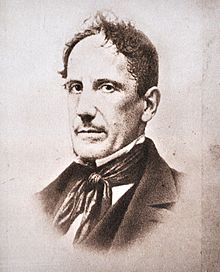Giuseppe Gioachino Belli
Giuseppe Gioachino Belli (born September 7, 1791 in Rome , † December 21, 1863 there ) was an Italian poet. He became known for his sonnets in the Roman dialect .
Giuseppe Gioachino Belli came from the lower Roman bourgeoisie. His father died of cholera or typhoid shortly after getting a job in Civitavecchia . His mother returned to Rome with her three sons, where the family lived in poor conditions.
The marriage of a wealthy woman allowed Belli to develop his literary skills. In 1824 the son Ciro was born. Belli went on trips to northern and central Italy. In Milan he got to know the local dialect poetry and satire, which had been further developed by Carlo Porta (1775-1821). This became the model for his own sonnets in the Roman dialect.
Belli's sonnets became satirical and anti-clerical, but his political views remained largely conservative throughout his life. During the uprising of the Roman Republic in 1849, he defended the rights of the Pope.
After the death of his wife in 1837, Belli's situation deteriorated again. In later years he lost much of his vitality and referred to himself as a "dead poet". He wrote his last dialect sonnet in 1849.
In his later years, Belli worked as an artistic and political censor for the papal government. He hindered the spread of the works of William Shakespeare , Giuseppe Verdi and Gioachino Rossini in Rome.
Giuseppe Gioachino Belli died as a result of a stroke. His nephew, the painter Guglielmo Janni (1892-1958) wrote a monumental biography in 10 volumes about him, which was published in 1967 posthumously.
A selection of his sonnets was translated into German by Otto Ernst Rock . On May 2, 2013, the Vatican issued a commemorative stamp to mark the 150th anniversary of Belli's death.
literature
- Ernest Bovet : Le peuple de Rome vers 1840 d'après les sonnets en dialecte transtévérin de Giuseppe-Gioachino Belli . Neuchâtel / Rome 1898
| personal data | |
|---|---|
| SURNAME | Belli, Giuseppe Gioachino |
| BRIEF DESCRIPTION | Italian poet |
| DATE OF BIRTH | September 7, 1791 |
| PLACE OF BIRTH | Rome |
| DATE OF DEATH | December 21, 1863 |
| Place of death | Rome |

